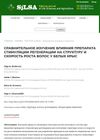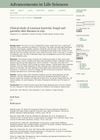2 citations,
April 2022 in “Medicine” A Chinese boy's scalp infection from a guinea pig was cured with medication.
2 citations,
July 2021 in “Genes” A specific genetic change in the KRT71 gene causes a hair loss condition in Hereford cattle.
1 citations,
April 2024 in “Pathogens” A pet ferret had a serious infection from Mycobacterium xenopi, which can spread to humans.
 1 citations,
February 2024 in “Medicine”
1 citations,
February 2024 in “Medicine” Eosinophilic cystitis is often misdiagnosed, but accurate diagnosis and treatment improve outcomes.
 1 citations,
February 2023 in “Drug Design Development and Therapy”
1 citations,
February 2023 in “Drug Design Development and Therapy” Plant adaptogens may help treat skin diseases and improve skin health, but more research is needed to fully understand how they work.
 1 citations,
January 2023 in “BMC Women's Health”
1 citations,
January 2023 in “BMC Women's Health” Polycystic Ovary Syndrome (PCOS) was found in 3.86% of tenth-grade girls in Guangzhou, China, with higher rates in overweight and obese girls, suggesting diagnosis should focus on hyperandrogenemia.
1 citations,
November 2022 in “Molecules/Molecules online/Molecules annual” Some calcium supplements have more calcium than their labels say, and a few have less.
1 citations,
November 2022 in “Animals” The research found specific genes and pathways that control fur development and color in young American minks.
1 citations,
November 2022 in “Nutrients” Hair glucocorticoid levels and gut bacteria are linked to growth rates in piglets.
 1 citations,
October 2022 in “Veterinary pathology”
1 citations,
October 2022 in “Veterinary pathology” Some canine hair follicle tumors contain amyloid deposits, with a protein called CK5 involved in their formation.
1 citations,
August 2022 in “Veterinary medicine and science” The main prostate diseases in dogs are benign growth, infections, and cancer, with various treatments ranging from drugs to surgery, but cancer treatments have limited success.
 1 citations,
February 2022
1 citations,
February 2022 Lavender scent in shampoo can relax and help with memory, while geranium scent can make you more alert and improve memory.
1 citations,
February 2022 in “Indian Journal of Nutrition and Dietetics/Indian journal of nutrition and dietetics” Muslim women in Coimbatore with limited sunlight exposure due to cultural dress and lifestyle have low vitamin D levels.
1 citations,
January 2022 in “Journal of veterinary diagnostic investigation” A British Bulldog had a unique viral plaque caused by Canine papillomavirus 18, different from typical tumors.
 1 citations,
January 2022 in “Health”
1 citations,
January 2022 in “Health” COVID-19 has widely affected health, various industries, and the economy, but also led to more remote work and less pollution.
 1 citations,
November 2021 in “American Journal of Clinical Pathology”
1 citations,
November 2021 in “American Journal of Clinical Pathology” The conclusion is that certain physical signs in the body can indicate past acute and chronic stress, which may help in child abuse investigations.
1 citations,
August 2021 in “Medical Science Monitor” Male and female hair loss have different genetic causes.
1 citations,
July 2021 in “Veterinary Medicine and Science” A cat's skin condition was fully cured with cyclosporine A after other treatments failed.
 1 citations,
November 2009 in “Hair transplant forum international”
1 citations,
November 2009 in “Hair transplant forum international” Dr. Shoji Okuda's early hair transplantation techniques were rediscovered after being overlooked due to World War II.
Current hair regeneration methods show promise but face challenges in maintaining cell effectiveness and creating the right environment for hair growth.
 December 2024 in “Veterinary Sciences”
December 2024 in “Veterinary Sciences” Key genes and pathways improve wool quality in Zhexi Angora rabbits.
 November 2024 in “Applied Sciences”
November 2024 in “Applied Sciences” Wild strawberry waste extract can be a sustainable cosmetic ingredient for treating acne and hair loss.
 November 2024 in “Applied Sciences”
November 2024 in “Applied Sciences” Placenta products might help with hair loss, but more research is needed.
 October 2024 in “Biology”
October 2024 in “Biology” Dermal papilla cells can help regrow hair and are promising for hair loss treatments.
 August 2024 in “Siberian Journal of Life Sciences and Agriculture”
August 2024 in “Siberian Journal of Life Sciences and Agriculture” Melatonin and lyotritone improve hair growth and quality in white rats.
 July 2024 in “Advancements in Life Sciences”
July 2024 in “Advancements in Life Sciences” Fungal infections are the most common skin disease in cats, especially white ones.
 July 2024 in “Journal of Cosmetic Dermatology”
July 2024 in “Journal of Cosmetic Dermatology” Fractional laser therapy is a promising, effective, and minimally invasive treatment for hair loss.

A genetic mutation in the EDA gene causes hypohidrotic ectodermal dysplasia in cats.

Anifrolumab treatment improves quality of life and reduces disease activity and steroid use in SLE patients.
May 2024 in “Journal of Fungi” Tinea capitis in adults, especially postmenopausal Black women, needs prompt treatment with oral antifungals to avoid scarring.
















